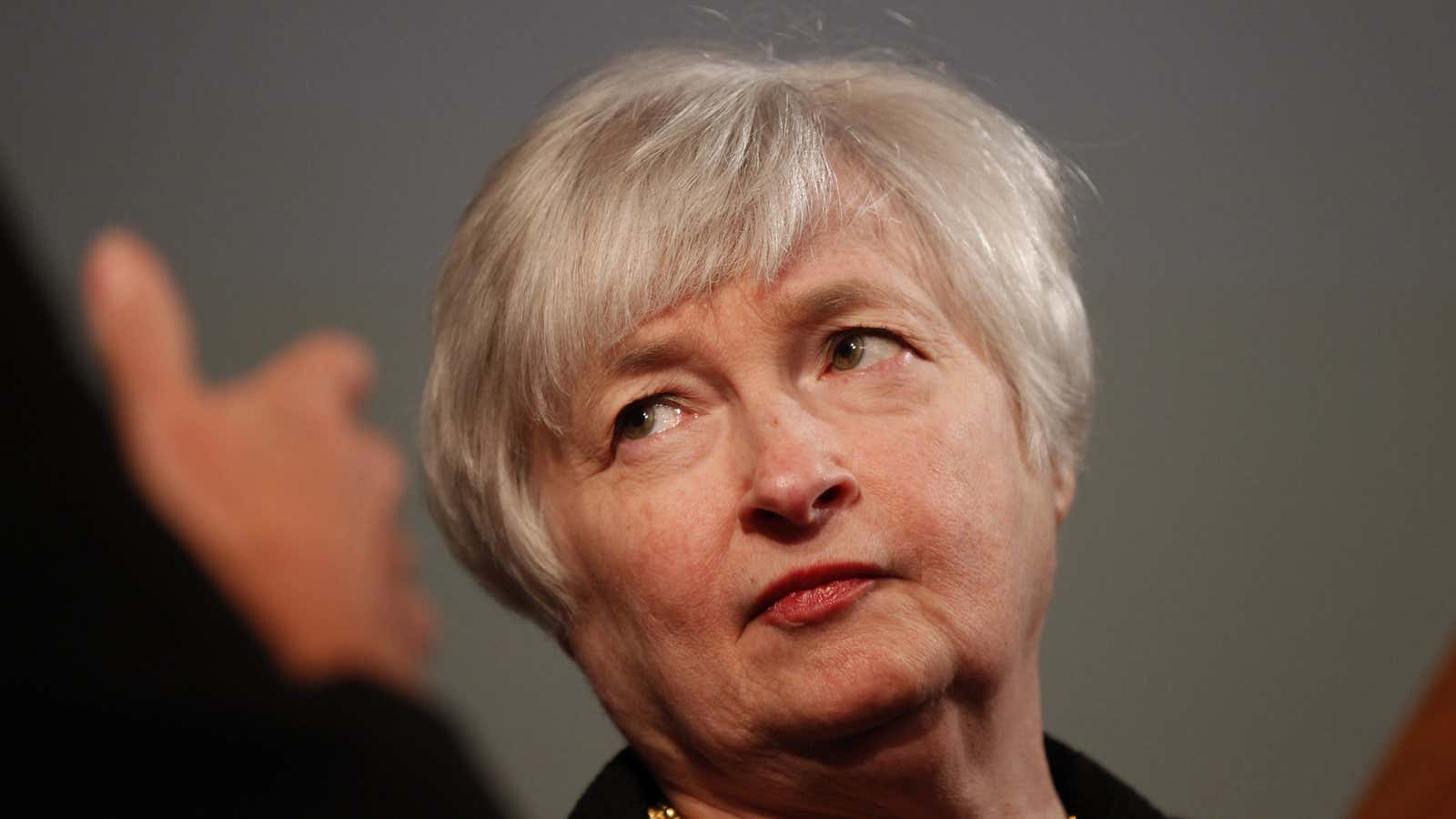With US president Barack Obama set to tap Federal Reserve vice chair Janet Yellen as the next chairman of the Fed later today, it’s worth noting that her ascension is more than a story about global economic policy making. With apologies to former secretary of state Hillary Clinton, Yellen is about to become the most powerful woman in US history.
How can we make such a claim? After all, Nancy Pelosi became the speaker of the US house in 2007, she was arguably the most-powerful woman ever elected in the US. And Hillary Clinton, Condoleeza Rice and Madeleine Albright ran the State Department. (The secretary of state is the highest-ranking member of the presidential cabinet.) Moreover, the US has had four women on the Supreme Court bench, where lifetime appointments put Sandra Day O’Connor, now retired, Ruth Bader Ginsburg, Elena Kagan and Sonia Sotomayor beyond the political powers of even the president. All accomplished, powerful women, without doubt.
And there have been plenty of women who held enormous power in Washington without holding office. Eleanor Roosevelt comes to mind, as she was the longest-serving US first lady, with great influence on policy. After a stroke incapacitated president Woodrow Wilson while he was in office, his second-wife Edith held enormous power.
But this silver-haired, Brooklyn-born, Berkeley economist is about to top them all—assuming that her nomination is confirmed by the Senate, which is pretty much assured. The reason why has to do with the unique position of the Federal Reserve as an independent part of the federal government as well as the power of the chairman within that institution.
So first off, the Fed has independence. But it isn’t absolutely independent. It is a creature of Congress, having been created by the Federal Reserve Act of 1913. And the nightmare scenario of Fed chairmen past and present has been that Congress could take away some of its independence through legislation. But its independence remains substantial.
For instance, unlike secretaries of state Madeleine Albright and Hillary Clinton, the decisions made by the organization Janet Yellen will lead next year are not subject to approval by anyone in the executive branch of the government. From an operational standpoint, the president will not be Yellen’s boss during her four-year term, which—in another nod to independence—intentionally does not coincide with that of the president. (Although, she probably wouldn’t be reappointed if the occupant of the Oval Office disapproved of her Fed leadership.)
But what about Pelosi? As speaker of the House, she held—albeit only for a couple years—the keys to powers of the purse that the Constitution granted to the legislative branch. Well, what will soon be the Yellen Fed doesn’t have to ask Congress for money. As the Federal Reserve funds its own operations, it is not subject to the usual constraints of the congressional appropriations process.
Now, it’s true that Congress as a whole could curtail some of the powers of the Federal Reserve. But remember, we’re comparing the power of individual people, not just institutions. And messing with the Fed would be a pretty big legislative project that would require a lot of cajoling, arm-twisting and bargaining. In other words, it’s not up to the speaker of the House alone. A similar amount of coalition building would be necessary to swing opinions on the Supreme Court.
In fact, in terms of institutional power, the chairmanship of the Fed might most resemble the chief justice of the Supreme Court. (A woman chief justice could perhaps be a rival to Yellen in terms of institutional power. But O’Connor, Sotomayor and Ginsburg have never held that post.) For instance, the Fed chair is also the chair of the Federal Open Market Committee (FOMC)—the Fed’s key monetary policy body. In theory the chairman is just one vote on that body. But in practice, the Fed chief exerts outsized influence in the setting of monetary policy. It’s also important to note that, outside of the FOMC, the Fed chairman holds huge sway in many important areas, such as financial regulation. (Former Fed chairman Alan Greenspan, for example, famously resisted derivatives regulation, which didn’t work out so well.)
And, by the way, we haven’t even gotten to how powerful the Fed actually is. It controls the money supply in the world’s largest economy. During banking crises it acts as chief firefighter of the financial system. It has acquired broad and important regulatory powers since the Great Recession. In recent years, the Fed’s efforts to keep pumping money into the world financial system has been alternately credited with a surging US stock market and violent capital flows churning up storms around the world economy.
A misplaced word from a Fed chairman could have huge ramifications for the economy as a whole and the 300 million Americans within it. Similar slips coming from the speaker of the house, secretary of state or a supreme court justice barely register outside the beltway.
In short, there’s a reason that former Fed chairman Greenspan was often called the second-most-powerful person in Washington when he held the reins at the central bank. And now those reins will be in the hand of a woman. And it’s about time.
